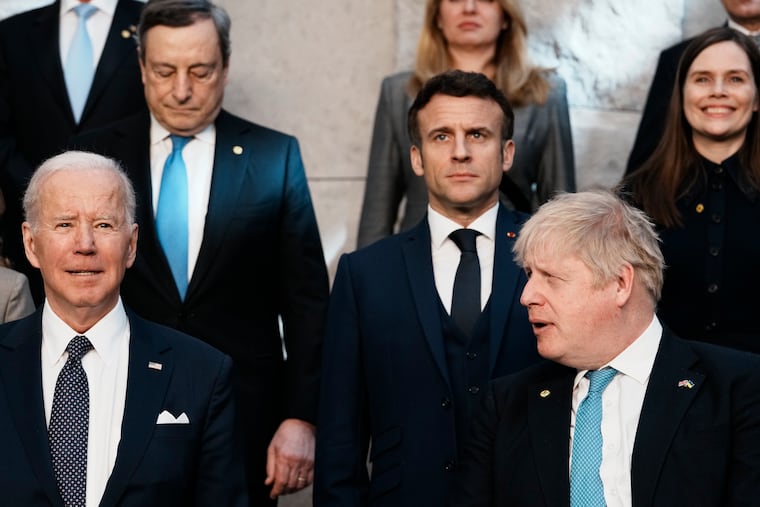Don’t let Putin’s nuclear and chemical threats stop us from giving Ukraine what it needs | Trudy Rubin
Pentagon fears of escalating the war and of Russian nuclear and chemical weapons have permitted Putin to dictate the terms of what weapons we give Ukraine.

Russia’s threats to use nuclear weapons have been a shadow over the Ukraine war and were a key topic at Thursday’s emergency NATO summit in Brussels.
Yet the biggest danger posed by Vladimir Putin’s nuclear, chemical, or biological weapons may not be their actual use in Ukraine. The mere threat of deploying weapons of mass destruction appears to be deterring NATO from sending Ukraine the critical weapons systems it needs to survive.
Early in the war, Putin proclaimed he had put his nuclear arsenal on “special combat duty regime,” an ambiguous term that hinted at a dangerous escalation. He also warned that outside interference in Russia’s war would trigger consequences “never before experienced in your history.”
The nuclear saber-rattling has continued. In an interview with CNN on Tuesday, Putin’s chief spokesman Dmitry Peskov refused to rule out that Russia would consider using nukes against anything it saw as an “existential threat.” Such a threat, presumably, could include further Ukrainian military gains.
So the question of the hour is this: Will the U.S. and NATO give Ukraine the critical weapons systems it needs to force Putin into serious negotiations? So far, Putin’s threats of escalation seem to be effective. The Ukrainians have yet to receive weapons that can push the Russians back.
» READ MORE: An elegy for Mariupol, where I walked six weeks ago | Trudy Rubin
“There is an overconcern about Russian reaction,” I was told by retired Lt. Gen. Ben Hodges, former commander of the United States Army Europe. “The Russians talk about use of nuclear weapons because they see that it freezes us in place.”
The use of a nuclear weapon would seem to offer Putin little advantage. In theory, it could be a tactical weapon — one with a far lower yield and traveling a shorter distance than a strategic weapon used in a full-scale war. But even such a weapon, often designed for a battlefield, makes little sense since the nimble Ukrainian army never confronts the Russians en masse.
Dropping a low-yield nuke onto a town — which could still do terrible damage — would turn the entire world against Putin, probably even China, because it would crack a nuclear taboo that has existed for nearly 80 years.
A more likely scenario, says former NATO commander and retired Air Force Gen. Philip Breedlove, would be a nuclear “demonstration,” by directing a low-yield nuclear weapon into the Black Sea or out into a big forested area. But Breedlove, too, believes that “for Putin to use nuclear weapons, he has to be in a very desperate place. I do believe the West would go over the edge.”
For that reason, Breedlove believes Putin is more likely to use chemical or biological weapons, something the Russian leader already tried out in Syria — and on political opponents. “He may believe he can get away with this, while a nuclear attempt might cross NATO’s threshold.”
False Russian claims that the United States is working on such weapons in Ukraine seem like a cover story for using chemical weapons themselves. Chemical weapons disperse in the air, so they would have to be dropped where they would impact closed spaces. Such weapons would probably target civilians hiding in shelters.
President Joe Biden said in Brussels on Thursday that “we will respond” to any chemical weapons use. The White House has assembled a national security team to develop scenarios of how the U.S. and allies should respond if Putin uses any form of weapons of mass destruction.
But why are we only talking about responding? Why aren’t we staring Putin down to prevent him from committing these crimes?
Focusing only on a response to chemical or nuclear attacks is letting Putin set the terms of this war with his threats. Instead, the White House should be sending a proactive message to Putin about what he will face if he dares imitate Adolf Hitler by gassing Ukrainians to death. “Putin’s point is to deter us. It is working right now,” Breedlove says.
And why is the administration still refusing, or failing, to send Ukraine the critical systems it needs to push Russia back, even as the Russians turn Mariupol and Kharkiv into rubble? The Ukrainians have held back the Russian advance for a month, but the country is taking terrible losses.
» READ MORE: As Putin commits war crimes, how does war in Ukraine end? | Trudy Rubin
President Volodymyr Zelensky has begged for weeks for MiG-29 planes from NATO allies, but the Pentagon claims they will “escalate” the fighting. Yet Putin escalates his war crimes every day.
The Biden team deserves credit for the weapons it has belatedly sent to Ukraine. But the country desperately needs anti-ship missiles to fend off Russian efforts to seize the critical ports of Odessa and Mariupol. Ukraine needs long-range Russian-made S-300 anti-missile systems, which the Pentagon is working on getting but hasn’t delivered. It needs more armed drones.
The best way to prevent Putin’s blackmail is not to bow to his threats, but for NATO to signal a promised tough response to any use of chemical or nuclear weapons — and to give the Ukrainians the critical weapons they need.